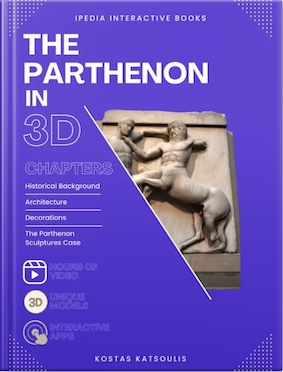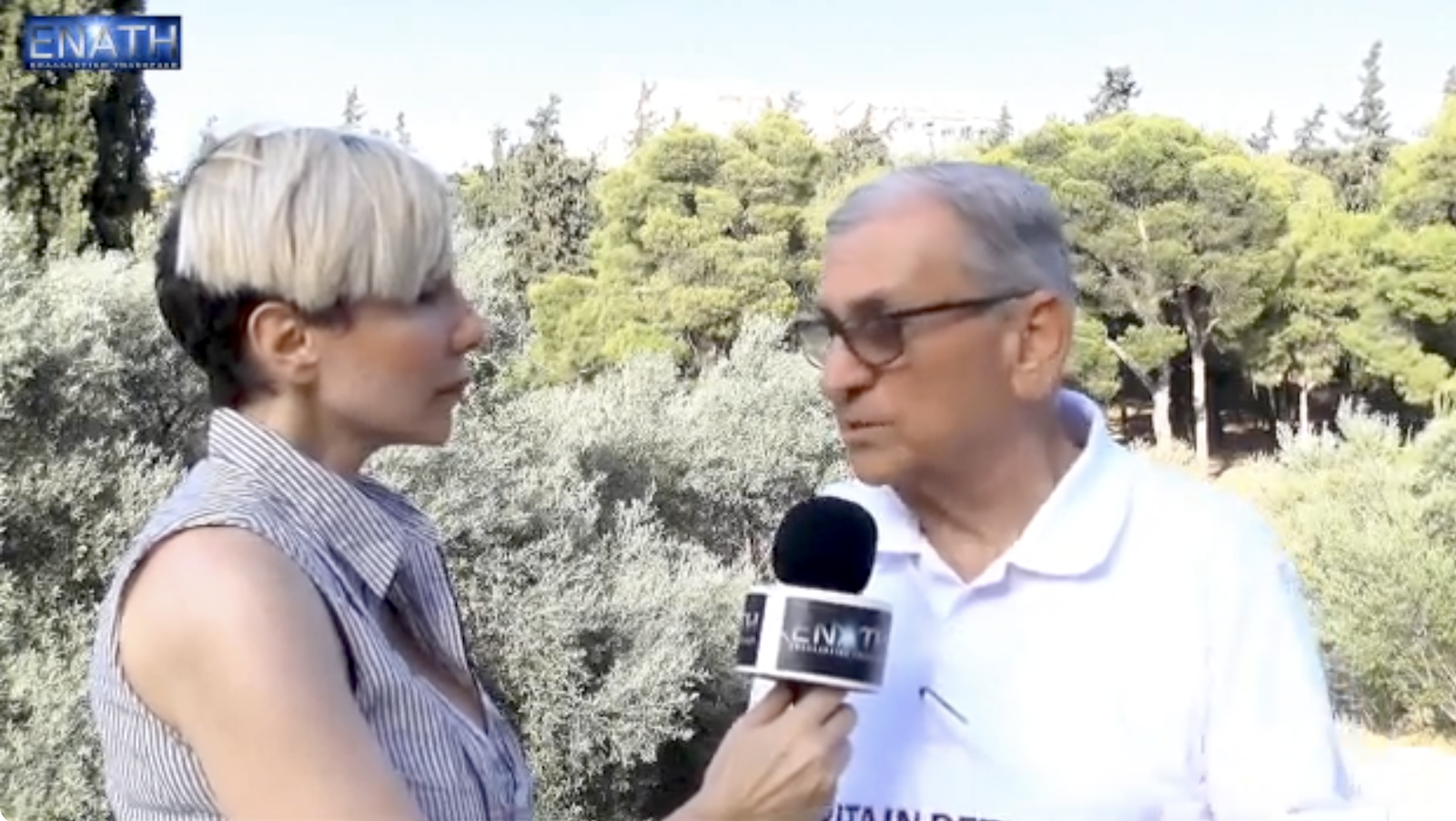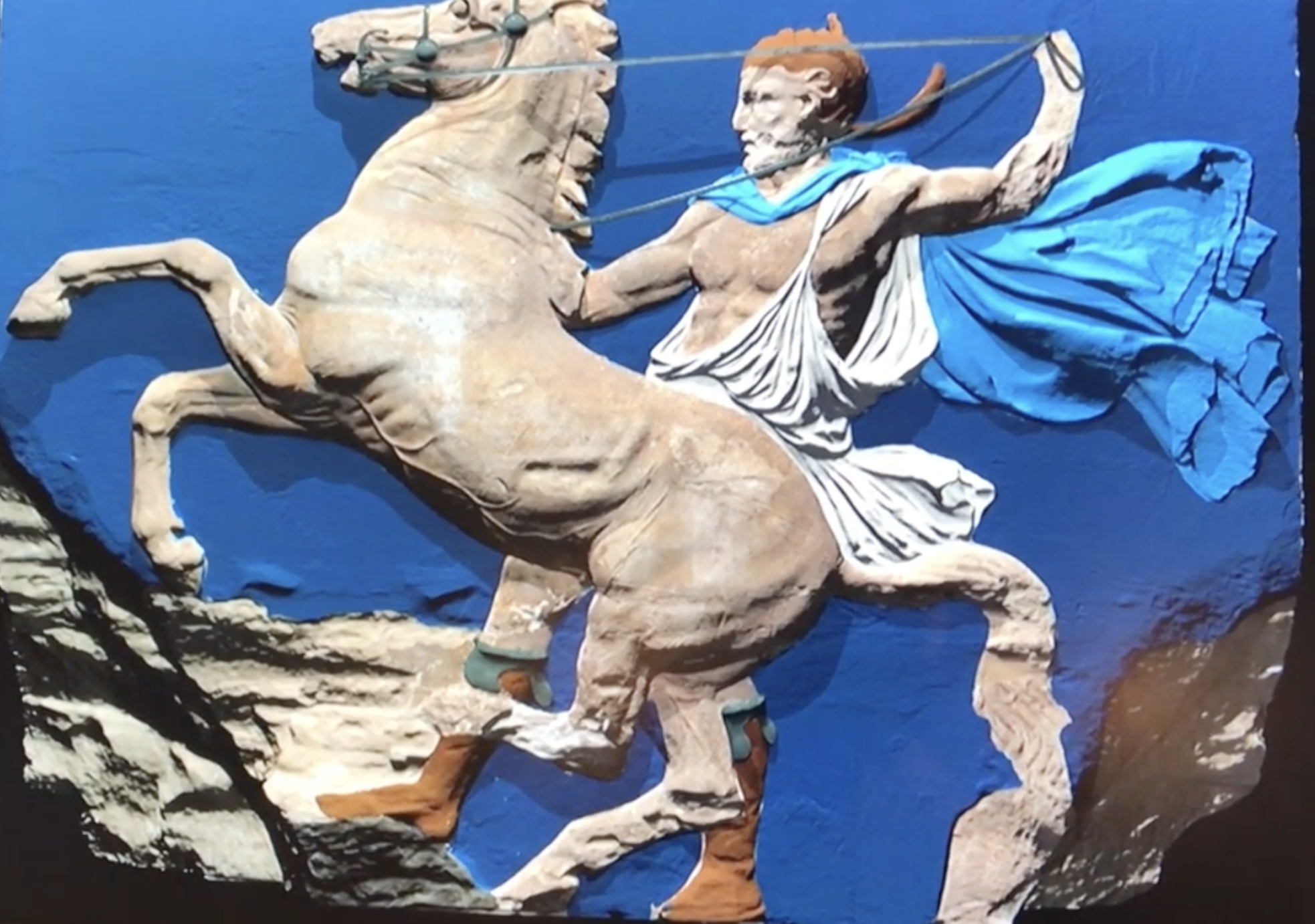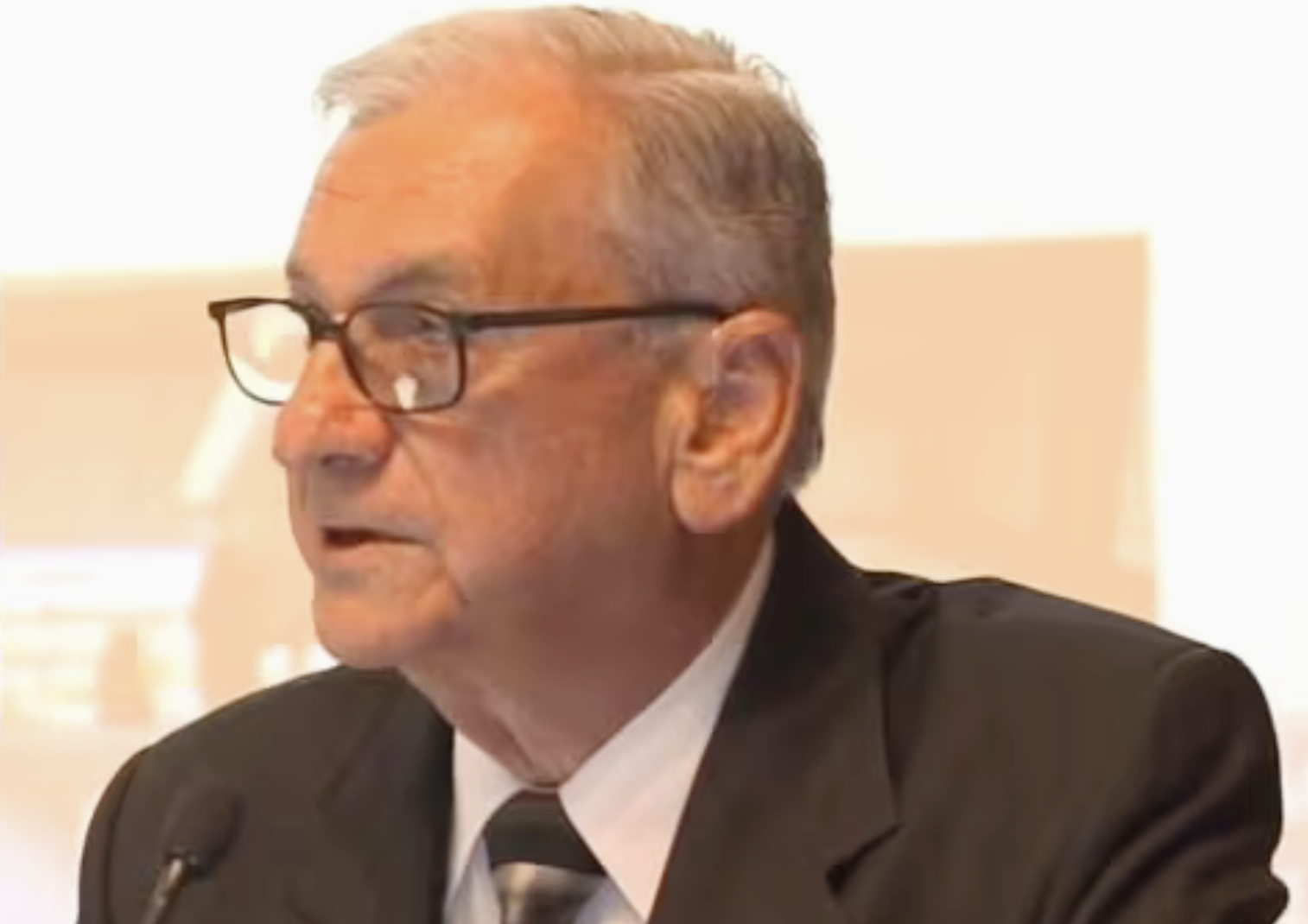
This was an address to the Royal Commonwealth Society of NSW on the occasion of the Greek Night organised by the Kytherian Ladies Auxiliary Committee on 22 February 1986.
We publish this because it is a document from the very early stages of our activity. Emanuel explains what led him to be a pioneer in seeking the return of the Parthenon Marbles. Active in this cause from 1976, he went on to form the first committee in the world, outside Greece, to campaign for the reunification of the Parthenon Marbles, in 1981.
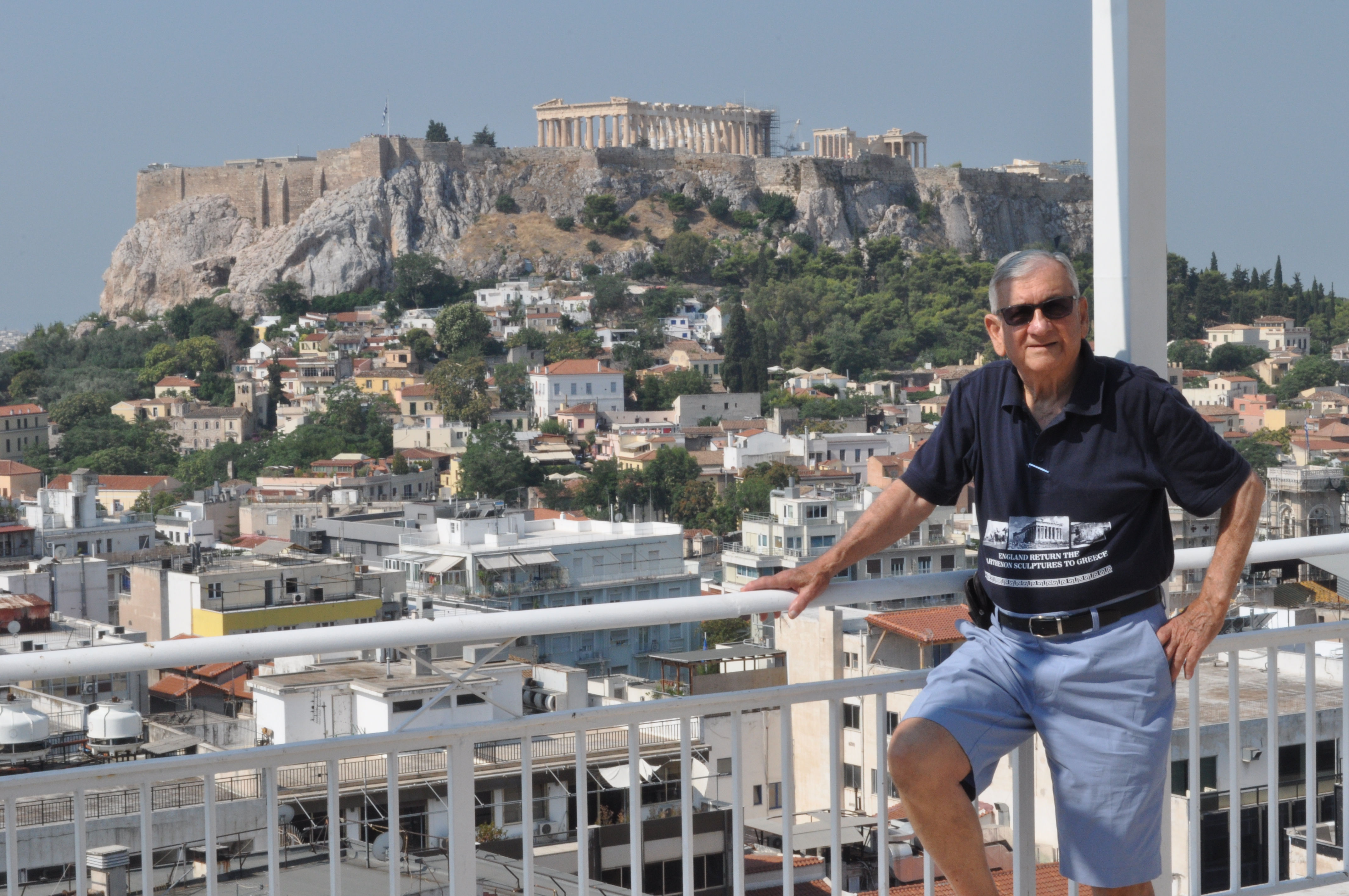
Emanuel J Comino AM, founder of the International Organising Committee – Australia – for the Restitution of the Parthenon Marbles. Athens 2015
Distinguished guests, ladies, and gentlemen.
When one is asked to speak on Greek history, it’s culture and traditions or the Greek people in Australia, it is not as easy as one may think because I don’t know where to start and where to finish. So allow me to start by saying that for thousands of years Greece and her people of the past and present have given so much to the world. You don’t have to go far, only a few blocks away from here, you walk through Hyde Park and the Domain and you will see the Hellenistic beauty, you will note that there are those unique artistic columns, the Doric, the Ionic and the Corinthian Columns, you will also see the names of Homer, Socrates, Plato, Archimedes, Sophocles, Praxiteles, Pythagoras, Diogenes, Solon, Hippocrates, Periklis, Aristotelis and many others on our national and university buildings, and not only in this beautiful city of ours, Sydney but all around the world.
And what does this mean? It means that the Hellenic people are sharing with the world the glory and beauty that was Greece and still is today.
The Greeks, wherever they went, they built city-states, spoke Greek, practiced democracy and their religion. When one knows the Parthenon on Acropolis, was built between 447-432 BC for the Goddess Athena, the Goddess of Wisdom, and some 1000 years later, another great building was built by Greeks at Constantinople the Agia Sophia, for the Christian faith, which means Holy wisdom.
One must never forget that these two unique buildings. No other structures or architecture built by men have ever equalled the beauty, symmetry, and symbolism of the Parthenon and Agia Sophia. They will live forever.
No doubt you have all heard of the Greek Government request to the British Government for the return of the Parthenon Marbles to Greece, otherwise known as the Elgin Marbles.
These ancient treasures were taken from Greece by Lord Elgin about 1800 while Greece was under Turkish rule and had no say in the matter whatever, and just in case you don’t know the real reason why he took the Marbles from the Parthenon – he took them to decorate his mansion in Scotland. But by 1816 after getting into financial difficulties he eventually sold them to the British Museum for £35,000 although they were valued over £100,000. Their home ever since has been the British Museum.
Just to enlighten you all, there is a very strong British committee formed in December 1982 in London and it is named the British Committee for the Restitution of the Parthenon Marbles to Greece under the chairmanship of that distinguished scholar Professor Robert Browning. His Committee consists of Professors, businessmen, play-wrights, members of parliament, and many others. The aim of these distinguished Englishmen is to bring the facts and arguments to the British people to win public support in England and to urge the British Government to change its mind to have the Parthenon Marbles returned to their rightful place in Greece.
There is also an Australian committee formed in Sydney that is supporting the British Committee in the struggle for the return of the Parthenon Marbles to Greece, it is called the AHEPA (Aust) Committee for the Restitution of the Parthenon Marbles. I just happen to be the chairman of the Australian Committee. My Committee’s aim is to assist the British Committee to undo the wrongs of history.
These strong feelings about my Greek heritage were not always with me. I recall well my early years in Rockhampton, Queensland where I was born. My father took me to Greece in 1938 after my mother’s death. We were caught in Greece during the 2nd World War. It was a bitter experience and when we returned to Australia after the War, I didn’t want to have hardly anything to do, with anything Greek.
When I was 19 years old and doing my National Service in the RAAF in Townsville, at a special Officers night I met an Englishman (that changed my whole thinking of anything to do with Greek). He was an Air Commodore in the RAF. He was on a special mission in Australia. We got talking and he said to me, Comino; that is a Greek name and should be called Cominos with an ‘S’ at the end. I was a very shy youngster of 19 at the time. I said to him that I am an Australian, I was born in Rockhampton, Queensland, my father came to Australia (from Greece) when he was only 11 years old and my mother also came very young. Thus making me an Australian and not a Greek. To this day I can never forget what this Englishman said to me and in the manner in which he expressed himself to me. He said, no my boy, you are Greek and you should always be very proud to be a Greek because the world owes a lot to Greek history and to the Greek people. From that moment on I wanted to know all about Greece, its history, and its people, so believe me I am still learning 33 years later. It is more than interesting learning about one’s heritage, I can assure you.
What is the Greek contribution to Australia? To begin with, there are 3/4 of a million Australians of Greek origin, about 1/3 of these migrated here, the others are their Australian born children and grandchildren.
I should point out that nearly all of these people maintain a sense of Greek heritage while being good loyal Australians. They maintain a strong affiliation with the many Greek Orthodox parishes, churches, and associations in Australia and are conscious of the importance of the preservation of the family unit. I could point out that there are approximately 40,000 children being taught Greek in after-hours schools, run mainly by the Greek Orthodox parishes in Australia.
The Greeks in Australia started off as shopkeepers and as labourers, but within one generation we have a prosperous community with very large numbers of professional people, lawyers, Q.C.s, judges, medical specialists, university professors, members in all professions. There are eleven members of parliament, state and federal in Australia, leaders in commerce and business, knights, and many people who have been honored by her Majesty the Queen, and the Government of Australia.
The ties between Australia and Greece are very strong, the two nations have fought side by side in both World Wars. In the 2nd World War, Australian, British and Greek forces, fought the might of Hitler’s army in the heroic campaigns of Greece and Crete. Let me recall two significant historical statements made by Winston Churchill at the time.
First – “It is said that Greeks are fighting like heroes, but from this moment on we should say – the heroes are fighting like Greeks.” and secondly and more importantly he said: “It is not the glory that was Greece, but the glory that is Greece.”
Migration is nothing new to the Greek people. They have been migrating since the Doric invasions of 1100 BC. Within 600 years of that time, there were more Greeks living in Sicily and what are now Turkey and Syria than there were on the mainland of Greece. Today Greeks in America, Canada, Australia, Africa, and Western Europe number more than 4,000,000 people.
I don’t know if you know this, but migration from Greece to Australia started before the turn of the century, and they came mainly from 3 islands – Kythera, Castelorizo, and Ithaka. The Kytherian Greek community is old, well established, and very large, especially in New South Wales and Queensland. It is often said that Kythera is the 7th state of Australia. There are approximately 3,000 people left on the island of Kythera and about 80,000 in Australia of Kytherian descent. Any time you go to the Island you will run into Australians and English is spoken everywhere. For example, the postmaster of the little town of Milopotamos is reported to know by heart all the postcodes in Sydney.
For those of you interested in going to Kythera I should tell you that the island is the birthplace of the love goddess Aphrodite and it is known as “The Island of Love”.
Which brings me to the Kytherian Association of N.S.W. When I mentioned to my wife who is a member of the Kytherian Ladies Auxiliary Committee, that I have been invited by the Royal Commonwealth Society of N.S.W. to put on a Greek night, my wife, in turn, put it to the Ladies Committee and without any hesitation, they undertook to do it all themselves. I wish to thank all the ladies very much.
The Greeks are good settlers, they work hard and are progressive, but Australia has been very good to them too. Australia has provided a warm friendly atmosphere for these people.
There have been opportunities to work and to prosper. Schools, Universities, and the professions have been open to the new settlers and their children. Australia has been a wonderful and hospitable country.
Everyone is given the opportunity to do well and to be honoured for their successes in one field or another. That is why Australians of Greek descent are truly proud to call themselves Australians wherever they go. At the same time, they have a sense of history and heritage of which they are proud. Together with all other Australians, irrespective of their background, we work towards building up this great nation of Australia.
May I take this opportunity to thank Sir Arthur and Lady George for accepting our invitation with their presence here tonight. My thanks also to the Greek National Tourist Organisation for supplying us with all the Greek flags, and posters for this function.
In closing, I wish to express my deep appreciation to the Royal Commonwealth Society of N.S.W. for accepting me and for inviting me to speak this evening.
EMANUEL JOHN COMINO OAM

